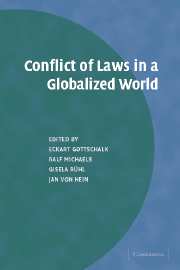Articles for October
There are a few private international law pieces forthcoming in English journals over the next month or so (encompassing articles, case-notes and book reviews.) In no particular order, they are:
1. Review: “Dicey, Morris and Collins on The Conflict of Laws”, reviewed by Lorna Gillies, Civil Justice Quarterly 2007, 26(Oct), 524-526.
2. “Sale of goods and the relentless march of the Brussels I regulation“, Jonathan Harris, Law Quarterly Review 2007, 123(Oct), 522-528.
Comments on the European Court of Justice ruling in Color Drack GmbH v Lexx International Vertriebs GmbH (C-386/05) on whether a court had jurisdiction to hear a dispute under Council Regulation 44/2001 Art.5(1)(b) where there were several places of delivery within one Member State under a contract for the sale of goods.
3. “German Supreme Court refers another question to the ECJ“, Bob Wessels, Insolvency International 2007, 20(8), 127
Notes the decision of the German Federal Supreme Court in Bundesgerichtshof (IX ZR 39/06) to refer to the European Court of Justice the question of whether the courts of the country in which the main insolvency proceedings against a debtor are underway, have international jurisdiction under Council Regulation 44/2001 (the Brussels Regulation) in an avoidance action against a third party with its statutory seat in another country.
4. “The enforceability in Spain of a choice of foreign law clause“, Carlos Valls, International Company and Commercial Law Review 2007, 18(9), 328-330.
Comments on the Spanish Supreme Court ruling in Deutsche Seereenderei GmbH v Martico S.L, which concerned a dispute arising from a Maritime Agency Contract which the parties had agreed would be governed by German law. Considers whether the Supreme Court could hear an appeal based on the correct application of German law and, if so, whether the Supreme Court’s ruling would create a precedent for the interpretation of German law.
5. “The Hague Convention, the civil law and the Italian experience“, Maurizio Lupoi, Trust Law International 2007, 21(2), 80-89.
Discusses how domestic trusts operate in Italy under civil law, and criticises the provisions on the legal nature of a trust in the Hague Convention on the Law Applicable to Trusts and on their Recognition 1985. Explains Italian practice for drafting trust deeds and the courts’ approach to trusts. Examines how an amendment to the Italian Civil Code imposing limitations on dealings with assets will affect trust law.
6. “The Fifth Element” Marcel Lipelt, Law Society’s Gazette L.S.G. (2007) Vol.104 No.34 Page 34.
Highlights changes to EC law, by reason of the transposition of European Parliament and Council Directive 2005/14 into the national law of all member states, which make it easier for residents of a member state who are involved in road traffic accidents in other member state to pursue a claim for damages against the foreign third party insurer, including allowing proceedings to be issued in the courts of the member state in which the claimant is domiciled. Considers which laws the English courts will apply when dealing with such claims, in particular when assessing damages.
(This isn’t, by any means, meant to be a definitive list – if anyone knows of any other PIL-related articles about to be published, please do send me an email.)



 Cambridge University Press have published a new book on
Cambridge University Press have published a new book on  The contributors:
The contributors: